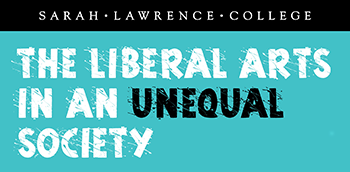Event Title
The Fundamental Inequality
Location
Donnelley Theatre, Heimbold Visual Arts Center
Start Date
15-11-2014 2:45 PM
End Date
15-11-2014 3:30 PM
Abstract
The fundamental inequality is not of money, or education, or health care, or any of the symptomatic inequalities that we focus on in the U.S. The fundamental inequality is of power. And power operates in a necessary web with knowledge and action. Action is about successfully organizing in large enough numbers and engaging in strategic enough action to create change. And that requires knowledge. Liberal arts institutions are about knowledge--not as a static bucket of what to think, but as a process of coming to know and successfully act on the world. How can they employ knowledge as a process to combat the fundamental inequality of power? First, they need to understand their complicity in unequal social relations of knowledge production, and ways to end their complicity. Second, they need to shift their knowledge production resources to engage and ally with oppressed, exploited, and excluded peoples organizing for power. This goes far beyond the popular service learning models that may do more to perpetuate inequality than to combat it. Instead, liberal arts institutions can draw on historical settlement house models and contemporary science shop models to accomplish this, but they must also overcome significant barriers in liberal arts institution culture and curriculum.
Presenter Biography
Randy Stoecker is a Professor in the Department of Community and Environmental Sociology at the University of Wisconsin, with a joint appointment in the University of Wisconsin-Extension Center for Community and Economic Development. He has a Ph.D. in Sociology from the University of Minnesota, and an M.S. in Counseling from the University of Wisconsin-Whitewater. He moderates/edits COMM-ORG: The On-Line Conference on Community Organizing (http://comm-org.wisc.edu), and conducts trainings and speaks frequently on community organizing and development, community-based participatory research/evaluation, higher education community engagement strategies, and community information technology. He has led numerous participatory action research projects, community technology projects, and empowerment evaluation processes with community development corporations, community-based leadership education programs, community organizing groups, and other non-profits in North America and Australia. Stoecker has written extensively on community organizing and development and higher education engagement with community, including the books Defending Community (1994), Research Methods for Community Change 2e (2013), co-author of Community-Based Research in Higher Education (2003) and co-editor of The Unheard Voices: Community Organizations and Service Learning (2009).
Streaming Media
The Fundamental Inequality
Donnelley Theatre, Heimbold Visual Arts Center
The fundamental inequality is not of money, or education, or health care, or any of the symptomatic inequalities that we focus on in the U.S. The fundamental inequality is of power. And power operates in a necessary web with knowledge and action. Action is about successfully organizing in large enough numbers and engaging in strategic enough action to create change. And that requires knowledge. Liberal arts institutions are about knowledge--not as a static bucket of what to think, but as a process of coming to know and successfully act on the world. How can they employ knowledge as a process to combat the fundamental inequality of power? First, they need to understand their complicity in unequal social relations of knowledge production, and ways to end their complicity. Second, they need to shift their knowledge production resources to engage and ally with oppressed, exploited, and excluded peoples organizing for power. This goes far beyond the popular service learning models that may do more to perpetuate inequality than to combat it. Instead, liberal arts institutions can draw on historical settlement house models and contemporary science shop models to accomplish this, but they must also overcome significant barriers in liberal arts institution culture and curriculum.



